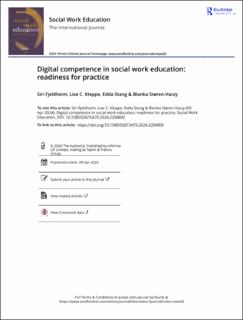Digital competence in social work education: readiness for practice
Peer reviewed, Journal article
Published version
Permanent lenke
https://hdl.handle.net/11250/3126297Utgivelsesdato
2024Metadata
Vis full innførselSamlinger
- Publikasjoner fra Cristin [3269]
- SAM - Institutt for sosialfag [471]
Originalversjon
https://doi.org/10.1080/02615479.2024.2334800Sammendrag
In line with the digital turn in service provision, social work students
should acquire relevant knowledge and skills, preparing them for
work within digitalized welfare services. In Norway, these expecta-
tions are articulated in a national learning outcome (LOC) that
addresses digital competence and the ability to assist in developing
and using technology. Previous research has revealed digital knowl-
edge gaps between education and practice . Here, we explore how
social work educators perceive of and engage with digital compe-
tence as expressed in the LOC. Through focus group interviews with
social work educators in Norway, we discovered that the knowl-
edge gap is linked to five key findings: (a) uncertainty about the
content of the LOC, (b) unfamiliar technical language, (c) the rapid
development of digitalization, (d) the distribution of responsibility
and (e) critical reflection. Critical reflection is expressed as a solution
to the challenges. We argue that there must be knowledge about
the subject matter (digital competency) that provides a foundation
for such critical reflection (digital literacy). More conceptual clarity is
needed regarding the LOC and what digitalization means in an
educational context, in order for both digital competency and
digital literacy to take their natural place in education.

